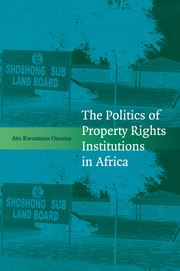Book contents
- Frontmatter
- Contents
- List of Maps and Tables
- Acknowledgments
- List of Abbreviations and Acronyms
- 1 Map of Botswana
- 2 Map of Ghana
- 3 Map of Kenya
- 1 Divergent Attitudes Towards Property Rights Institutions
- 2 Explaining Institutional Choice and Change
- 3 Varying Responses by Ghanaian and Batswana State Leaders
- 4 Traditional Leaders Take Charge in Akyem Abuakwa and Ga
- 5 Building and Then Demolishing Institutions in Kenya
- 6 Endogenous Contributions to Institutional Change
- 7 Conclusion
- Appendix: Notes on Field Research
- Index
- References
1 - Divergent Attitudes Towards Property Rights Institutions
Published online by Cambridge University Press: 04 May 2010
- Frontmatter
- Contents
- List of Maps and Tables
- Acknowledgments
- List of Abbreviations and Acronyms
- 1 Map of Botswana
- 2 Map of Ghana
- 3 Map of Kenya
- 1 Divergent Attitudes Towards Property Rights Institutions
- 2 Explaining Institutional Choice and Change
- 3 Varying Responses by Ghanaian and Batswana State Leaders
- 4 Traditional Leaders Take Charge in Akyem Abuakwa and Ga
- 5 Building and Then Demolishing Institutions in Kenya
- 6 Endogenous Contributions to Institutional Change
- 7 Conclusion
- Appendix: Notes on Field Research
- Index
- References
Summary
Kihika Kimani was an ingenious political leader. A small-time businessman and aspiring politician with little actual clout, he lost his 1969 bid to unseat Fred Kubai, the veteran MP (Member of Parliament) for Nakuru East in Kenya. Smarting from the defeat, he decided to harness the abundant possibilities for amassing and deploying political power presented by property rights in land to achieve his ambitions. He established the Ngwataniro land-buying company and convinced thousands of peasants in Nakuru to buy shares in it. The revenue from sales was supposed to then be used to buy large farms from departing white settlers, which would then be subdivided and distributed to shareholders. Registered in 1972, Ngwataniro had grown by 1975 to become a large company of more than 30,000 shareholders with assets ranging from ranches and farms covering tens of thousands of acres to schools.
Kimani then used Ngwataniro to rise to the heights of local and national power. He used funds from shareholders to conduct his political campaigns, although this led to massive losses for the company and the nonreceipt of land by many shareholders. He bought political support by giving company lands to many people who had no shares and punished political opponents who had shares by depriving them of land. He continuously forced shareholders to comply with his political demands by threatening their land rights.
- Type
- Chapter
- Information
- Publisher: Cambridge University PressPrint publication year: 2009



